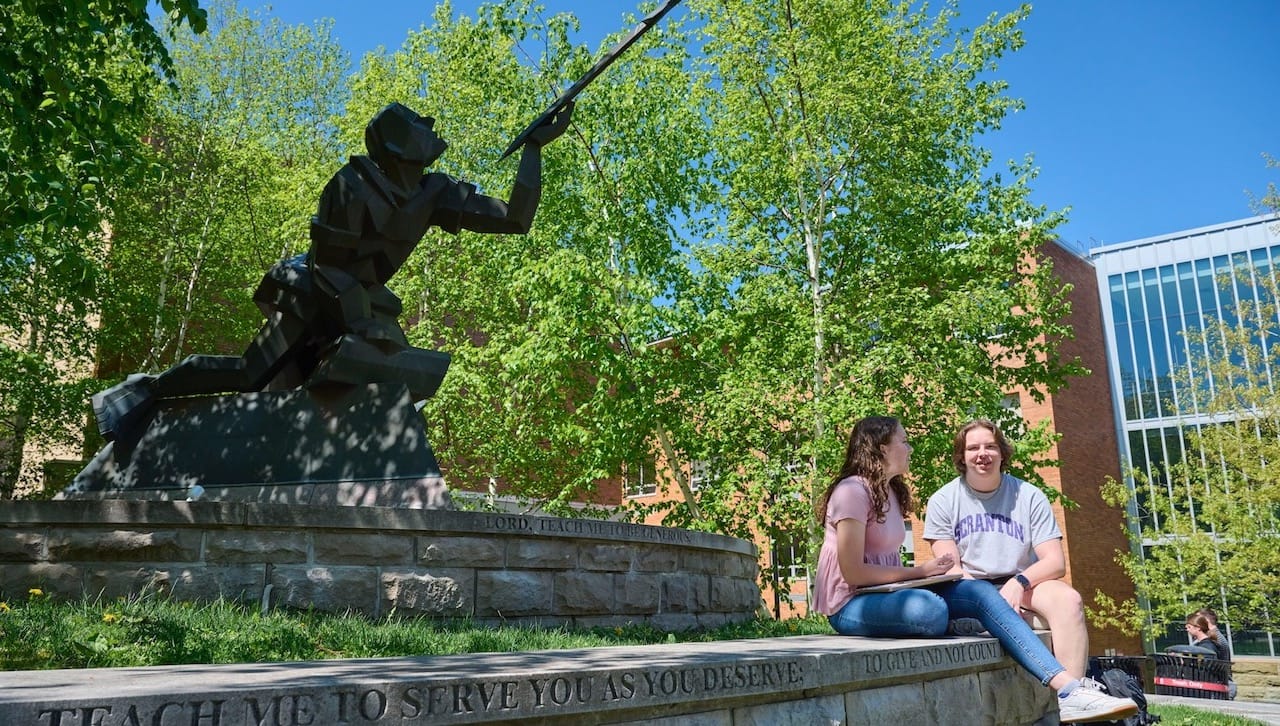University Answers Call of Pope to Care for Our Common Home

The University of Scranton has begun an extensive seven-year journey to become designated as a Laudato Si’ University by the Vatican. Inspired by Pope Francis’ 2015 encyclical letter “Laudato Si’: On Care for Our Common Home,” the University will join Catholic and non-Catholic colleges around the world who have committed to develop, implement and evaluate initiatives around seven goals to meet the Pope’s call for integral ecology, that is when science, ethics, spirituality and action are mutually respected and empowered. “The University of Scranton has answered this call and has joined a network of colleges across the globe to begin the process this academic year of becoming a Laudato Si’ University,” said Rev. Joseph Marina, S.J., president of the University, in an announcement to the University community. “Becoming a Laudato Si’ University allows us to enhance and extend the graces for which Scranton has been so richly blessed to the greater care of others and of the earth.”
“The University of Scranton has answered this call and has joined a network of colleges across the globe to begin the process this academic year of becoming a Laudato Si’ University,” said Rev. Joseph Marina, S.J., president of the University, in an announcement to the University community. “Becoming a Laudato Si’ University allows us to enhance and extend the graces for which Scranton has been so richly blessed to the greater care of others and of the earth.”
“The University community has always shown great care for one another, and inspired our students to become ‘men and women for and with others.’ For decades, we have called for and implemented sustainable practices throughout our community, from green chemistry classes, to a ‘Responsibility, Sustainability and Justice’ cornerstone course in our MBA program, to building LEED certified facilities, to hosting dozens of Earth Day events annually, and much, much more,” said Father Marina.
To be designated as a Laudato Si University, colleges must evaluate comprehensively current environmental and sustainability programs, then improve and develop further initiatives to address seven goals outlined by the Pope. The goals to be addressed are: to respond to the cries of the Earth; to respond to the call of the poor; to apply ecological economics; to adopt sustainable lifestyles; to implement ecological education programs; to develop ecological spirituality efforts; and to develop of programs to address community resilience and empowerment.
The seven-year plan calls on universities to develop and implement plans that progress from the beginning stage to midrange and advanced levels. A resource website for participating schools incudes lists of initiatives institutions could address, which involves not only a call for universities to review, record and decrease their carbon footprints, but extends to research, spiritual, educational, personal energy consumption and community programs, such as planting gardens, restoring land and supporting local farmer’s markets. Ideas listed include the development of an incentive program for community members to monitor daily cell phone/social media use and then reduce usage by 50 percent, the support of community-based research on local eco-social problems, and expanding the community bank campaign to include investment in green, sustainable business and organizations.
The journey begins with assembling a team of administrators, staff, faculty and students to conduct a comprehensive examination of what the university is currently doing and aspiring to do to “care for our common home” during the first year and create an action plan for the next six years. The Laudato Si’ website states: “(t)he goal is to have a Laudato Si’ Action Plan created by the university and for the university. The action plan would be implemented and evaluated in years two through six. Year seven would mark a time of celebration and official Vatican recognition of the institution as a Laudato Si’ University.”
According to the website, along with critical awareness of current environmental issues facing the planet, the action plans “must carry forward an integral awareness; that is, a recognition that earth-healing programs and activities have not only a public, social dimension, but also a personal, spiritual dimension.” The plans will address the critical needs of the poor. As Pope Francis said in Laudato Si’: “We are faced not with two separate crises, one environmental and the other social, but rather with one complex crisis which is both environmental and social.” The plans will address not only the social-structural changes needed to care for the earth and human society, but also “the personal transformations needed to live a sustainable lifestyle” and will include a “spiritual dimension, where students explore the depth of their calling to care for our common home.” The plans also call for “identifying and mobilizing constituents, welcoming the local community members into the university space, building trust, and finding solutions to local environmental problems.”
The University’s Laudato Si’ effort will be led by Michelle Maldonado, Ph.D., provost and senior vice president for academic affairs, and Daniel Cosacchi, Ph.D., vice president for mission and ministry. Members of Scranton’s Laudato Si’ working group are: Don Bergmann, chief of University Police; Ovidiu Cocieru, Ph.D., assistant professor of marketing, management and entrepreneurship; Rob Farrell, J.D., general counsel; Joan Grossman, Ph.D., associate professor of health and human performance; Jessica Nolan, Ph.D., professor of psychology; Sheli Pratt-McHugh, associate professor and chair, Weinberg Memorial Library; Nicholas Sizemore, Ph.D., associate professor of chemistry; Ed Steinmetz, senior vice president for finance and administration; Lori Walton, Ph.D., professor of physical therapy; and University students Clara Downey, a political science major from Easthampton, Massachusetts, and current president of Student Government, and Karla Shaffer, a political science major from Doylestown, and incoming president of Student Government.
Visit The University of Scranton’s sustainability webpage for information about the University’s current sustainability efforts.






